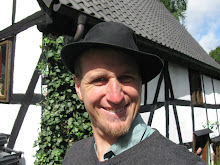It is a city of 4 million, yet when I ask a teenager for directions he walks half a block with me to show me the exact place, just as if it were a village.
Of course the Acropolis, an imposing rock, an island against potential invaders, rises like a fist in the midst of the city and draws all attention to it. Whenever I catch a glimpse of it, it always lifts my spirits... an effect, I learn, that is quite universal.
On or around it, you can see and touch history... the theatre where the plays of Aeschylus, Sophocles, and Aristophanes were performed, the agora where Socrates questioned and Diogenes disgusted the public, the little temple to the god of healing erected when besieged Athens was struck with plague... I could write screeds. Great things happen everywhere, all the time, yet in Athens we have records of them... many records.

Even the underground stations here are museums. Got some free space...? bung up a replica of the Parthenon freize. Better yet, display the ruins we discovered when digging this place out. Sometimes you can't move in Athens for ruins.
I've heard at the Acropolis in September you can't move for tourists - well, just a month later, it is a spacious place except on Sunday (Sundays November-March are free). It's also very warm and comfortable outside, unseasonably so... climate change is definitely noticeable to Greeks. There are down sides to travelling in November though... most sites close their gates by three oclock, meaning I have to plan my days quite carefully in order to see all the old stuff I want to see.
 Standing on glass above the ruins that surround the foundations of the new Acropolis museum
Standing on glass above the ruins that surround the foundations of the new Acropolis museumNo closing hours on the sites of my own personal pilgrimages though: through hints in history books and talking to local shop owners I manage to find the ruins of Plato's Academy, in a park in a district near Larissa train station. Well outside the walls of the ancient city, I rest here for a while, as people walk their dogs and scooters buzz near me. Visiting these old schools is rewarding for me. For the first time I can imagine the students here in three dimensions: some skiving off from a lecture to drink wine, some enthralled, some with a crush on their teacher. Here, the intellectual history of our world is not a sterile thing, it lives and breathes and gets bored and excited just as we do.





